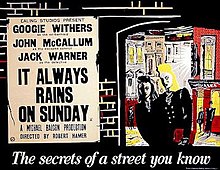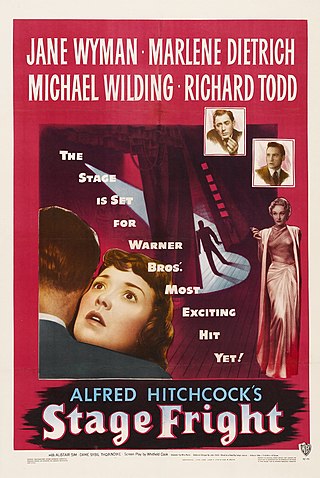
Stage Fright is a 1950 British thriller film noir directed and produced by Alfred Hitchcock and starring Jane Wyman, Marlene Dietrich, Michael Wilding and Richard Todd. The cast also features Alastair Sim, Sybil Thorndike, Kay Walsh, Hitchcock's daughter Pat Hitchcock in her film debut, and Joyce Grenfell in a vignette.
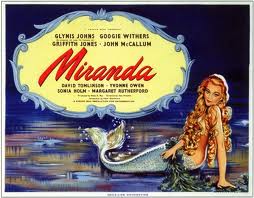
Miranda is a 1948 black and white British comedy film, directed by Ken Annakin and written by Peter Blackmore, who also wrote the play of the same name from which the film was adapted. The film stars Glynis Johns, Googie Withers, Griffith Jones, Margaret Rutherford, John McCallum and David Tomlinson. Denis Waldock provided additional dialogue. Music for the film was played by the London Symphony Orchestra, conducted by Muir Mathieson. The sound director was B. C. Sewell.
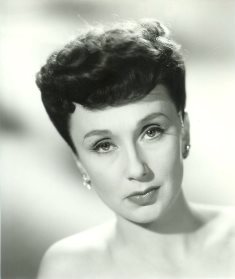
Georgette Lizette "Googie" Withers, CBE, AO was an English entertainer. She was a dancer and actress, with a lengthy career spanning some nine decades in theatre, film, and television. She was a well-known actress and star of British films during and after World War II.

The Narrow Margin is a 1952 American film noir starring Charles McGraw and Marie Windsor. Directed by Richard Fleischer, the RKO picture was written by Earl Felton, based on an unpublished story written by Martin Goldsmith and Jack Leonard. The screenplay by Earl Felton was nominated for an Academy Award.

The Fallen Idol is a 1948 British mystery thriller film directed by Carol Reed, and starring Ralph Richardson, Bobby Henrey, Michèle Morgan, and Denis O'Dea. Its plot follows the young son of a diplomat in London, who comes to suspect that his family's butler, whom he idolises, has committed a murder. It is based on the 1936 short story "The Basement Room", by Graham Greene.
Robert Hamer was a British film director and screenwriter best known for the 1949 black comedy Kind Hearts and Coronets and the now acknowledged 1947 classic It Always Rains on Sunday.
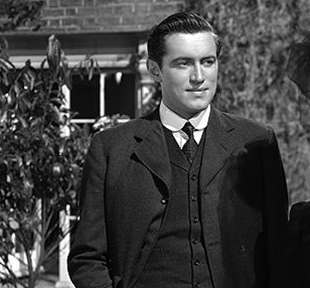
John Neil McCallum, was an Australian theatre and film actor, highly successful in the United Kingdom. He was also a television producer.

The Long Memory is a black-and-white 1953 British crime film directed by Robert Hamer and based on the 1951 novel of the same title by Howard Clewes.

Where Danger Lives is a 1950 American film noir thriller directed by John Farrow and starring Robert Mitchum, Faith Domergue and Claude Rains.

Lady Godiva Rides Again is a 1951 British comedy film starring Pauline Stroud, George Cole and Bernadette O'Farrell, with British stars in supporting roles or making cameo appearances. It concerns a small-town English girl who wins a local beauty contest by appearing as Lady Godiva, then decides to pursue a higher profile in a national beauty pageant and as an actress.

The Monkey's Mask is an international co-production 2000 thriller film directed by Samantha Lang. It stars Susie Porter and Kelly McGillis. Porter plays a lesbian private detective who falls in love with a suspect (McGillis) in the disappearance of a young woman. The film is based on the 1994 verse novel of the same name by Australian poet Dorothy Porter.
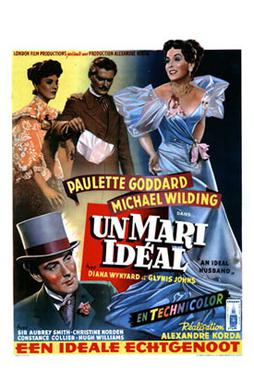
An Ideal Husband, also known as Oscar Wilde's An Ideal Husband, is a 1947 British comedy film adaptation of the 1895 play by Oscar Wilde. It was made by London Film Productions and distributed by British Lion Films (UK) and Twentieth Century-Fox Film Corporation (USA). It was produced and directed by Alexander Korda from a screenplay by Lajos Bíró from Wilde's play. The music score was by Arthur Benjamin, the cinematography by Georges Périnal, the editing by Oswald Hafenrichter and the costume design by Cecil Beaton. This was Korda's last completed film as a director, although he continued producing films into the next decade.
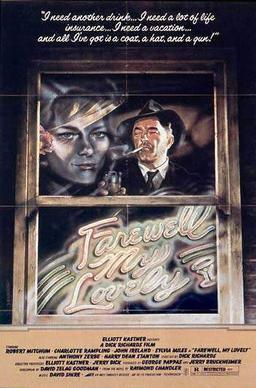
Farewell, My Lovely is a 1975 American neo-noir crime thriller film directed by Dick Richards and featuring Robert Mitchum as private detective Philip Marlowe. The picture is based on Raymond Chandler's novel Farewell, My Lovely (1940), which had previously been adapted for film as Murder, My Sweet in 1944. The supporting cast features Charlotte Rampling, John Ireland, Jack O'Halloran, Sylvia Miles, Harry Dean Stanton and hardcore crime novelist Jim Thompson, in his only acting role, as Charlotte Rampling's character's elderly husband Judge Grayle. Mitchum returned to the role of Marlowe three years later in the 1978 film The Big Sleep, making him the only actor to portray the character more than once in a feature film.

Sydney Tafler was an English actor who after having started his career on stage, was best remembered for numerous appearances in films and television from the 1940s to the 1970s.

Pink String and Sealing Wax is a 1945 British drama film directed by Robert Hamer and starring Mervyn Johns. It is based on a play with the same name by Roland Pertwee. It was the first feature film Robert Hamer directed on his own.
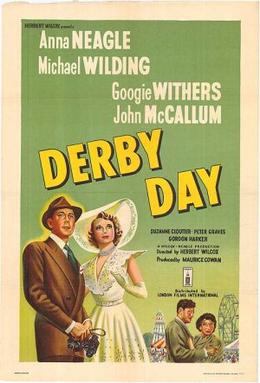
Derby Day is a 1952 British drama film directed by Herbert Wilcox and starring Anna Neagle, Michael Wilding, Googie Withers, John McCallum, Peter Graves, Suzanne Cloutier and Gordon Harker. An ensemble piece, it portrays several characters on their way to the Derby Day races at Epsom Downs Racecourse. It was an attempt to revive the success that Neagle and Wilding had previously enjoyed on screen together. To promote the film, Wilcox arranged for Neagle to launch the film at the 1952 Epsom Derby. In the United States, the film was released as Four Against Fate.

The Loves of Joanna Godden is a 1947 British historical drama film directed by Charles Frend and produced by Michael Balcon. The screenplay was written by H. E. Bates and Angus MacPhail from the novel Joanna Godden (1921) by Sheila Kaye-Smith.
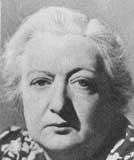
Gladys Henson was an Irish actress whose career lasted from 1932 to 1976 and included roles on stage, radio, films and television series. Among her most notable films were The History of Mr Polly (1949) and The Blue Lamp (1950).
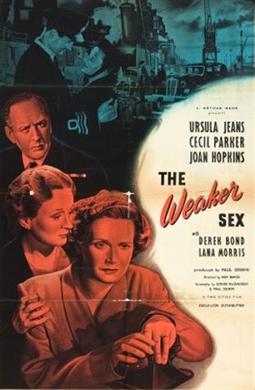
The Weaker Sex is a 1948 British drama film directed by Roy Ward Baker and starring Ursula Jeans, Cecil Parker and Joan Hopkins.
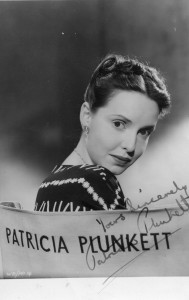
Patricia Ruth Plunkett was an English actress, born to an Australian WWI soldier, Captain Gunning Francis Plunkett, and Alice Park.
